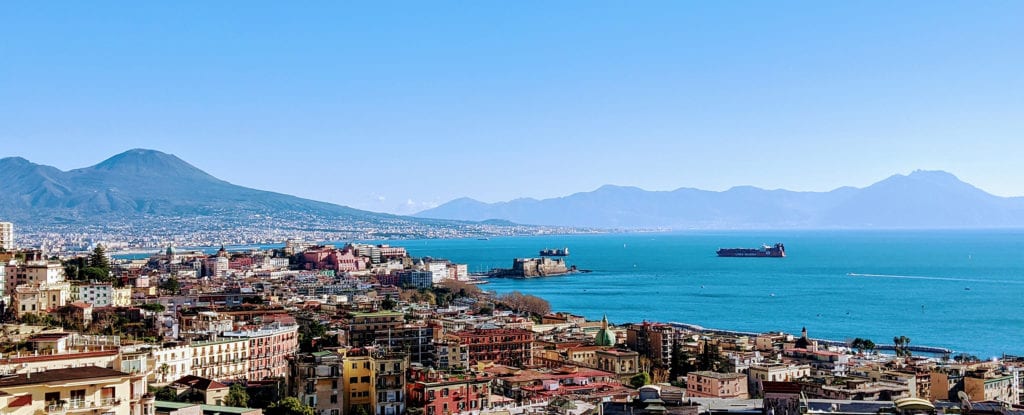Post COVID-19: Naples’ Chance for a Green Recovery
Southern Italy’s once-great port city has suffered in recent times – mass unemployment, corruption issues and a waste crisis have all contributed to the cloud hanging over the city. Now with the COVID-19 pandemic and its inevitable aftermath, there is a chance for sustainable development and a truly green recovery. It is an opportunity it cannot afford to miss.
Walking down Naples’ Via Tito Angelini, looking over the city sprawling away towards the slopes of Mt Vesuvius and the waves of the Tyrrhenian Sea, you notice something – the streets are a little quieter, the water is a little bluer, and the air is that little bit cleaner. The city is taking a collective breath.
The impact of the COVID-19 pandemic on the environment is well documented, urban air quality across Europe has improved and emissions are down. In a city that has been blighted by pollution and poor air quality, the respite is welcome.
For Naples, the fight to maintain a healthy environment for its citizens has been a long, drawn out struggle. Most notably it was under the international spotlight during its 14-year ‘state-of-emergency’ due to the waste management crisis in the region. The waste situation has now improved (for the most part), but air and water quality have not.
Italy is failing on emissions
A report by the World Health Organisation has placed Naples behind only Milan and Turin as the European cities with the worst atmospheric pollution levels. COVID-19 may have hit the pause button on the region’s emissions, but it won’t last for long.
In a study conducted before the coronavirus pandemic it was revealed that just 3.86% of the city budget was being directed towards “Sustainable development and protection of the territory and the environment.” Compare that with other Italian cities such as Rome (16.3%) and Genoa (15%) and shortfalls in funding become clear.
Just as worrying is that only 1% of sustainable development funds are being channelled into ‘air quality and pollution reduction’, with nothing focused on the ‘protection of water resources’. This despite calls for ‘immediate action’ to remedy the contamination of the Gulf of Pozzuoli, and the fact that Campania is home to the continent’s most polluted river – the Sarno. Something has to change.
Investing in sustainable growth
The heart of Naples is not its millennia-old historical centre, but its port. As one of the busiest passenger ports in Europe and with its high levels of commercial shipping, it is the lifeblood of the city.
However, the port of Naples is also disorganised and now littered with abandoned buildings. It is a symbol of careless, rapid expansion, and a focus on short-term goals. What’s left is an inefficient, dysfunctional port in an area with unemployment rates of over 30%.
Cities like Liverpool, Marseille and Lisbon have re-invented their waterfronts as hubs for culture and leisure. Such change for Naples could trigger a wave of sustainable development in the region.
Smart ports reducing climate impact
A smaller scale project to introduce bike lanes and decrease traffic on the Lungomare has been successful, but a more radical re-imagining of the Naples harbour is required to provide the impactful change the city needs. A redevelopment of the port can deliver exactly that – economic, social and environmental progress.
This hybrid port plan outlines a holistic approach to a multi-dimensional port area, combining urban and commercial development, easing traffic and developing more accessible green space in the inner-city.
The reduction in road congestion and maritime activity during the pandemic is seen as the key contributor to the reduction in emissions. A new ‘smart port’ with rail links, better accessibility and technological development can be the start to permanently reducing Campania’s pollution levels.

Italy’s green recovery plan
The city’s long-standing feeling of apathy towards sustainability and the environment is finally giving way as a new generation makes its voice heard. Before the COVID lockdown for example, Fridays for the Future strikes were taking place across the city as students of all ages marched in support of wide-spread reform.
Naples is ready to change.
With Italy set to receive €172 billion as part of the European Commission’s recovery fund for the effects of coronavirus, Giusseppe Conte, the Italian Prime-minister, has promised a spending plan with a focus on sustainability. Now he has to deliver.
Naples has a long, fractious relationship with Rome and its politicians, and the region has stagnated due to corruption and years of austerity.
But with the best approval ratings in Italian history, Conte has the opportunity to engage a population and re-establish Naples as the major European city it once was.
The time to act is now.
Neapolitans cannot afford for him to miss this chance.